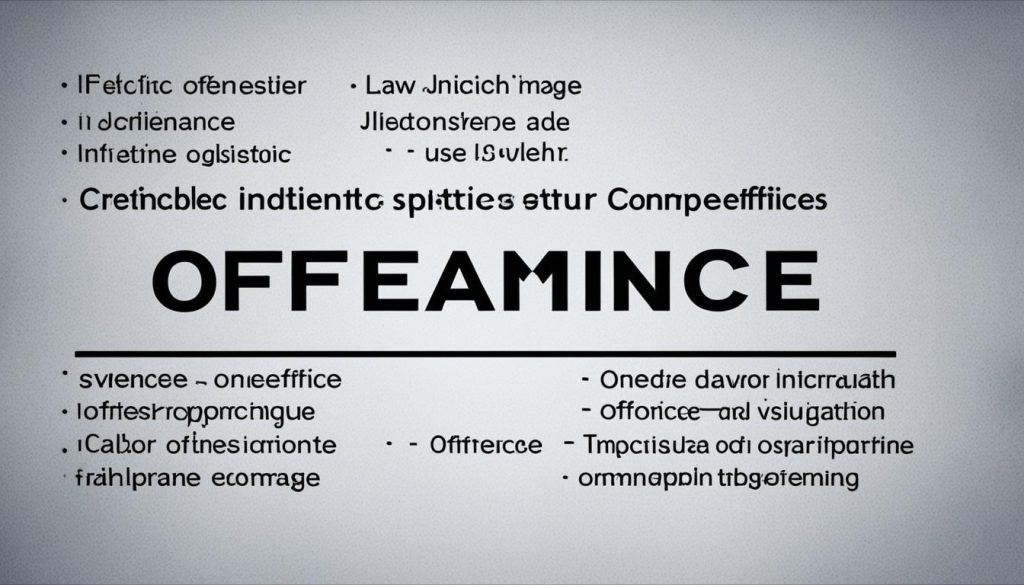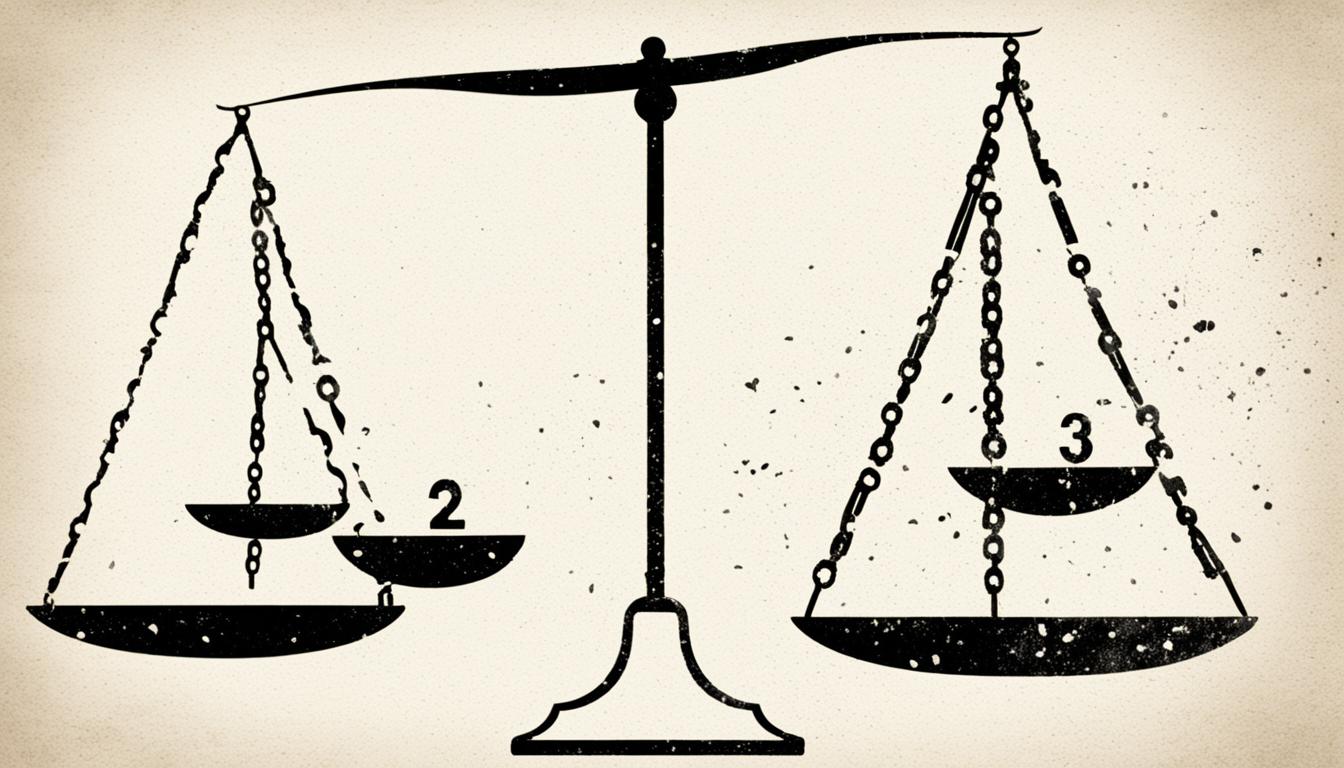Summary vs Indictable Offence Explained
Did you know that the Canadian criminal justice system classifies offences into two main categories: summary conviction offences and indictable offences? The distinction between the two can have a significant impact on the severity of penalties and the legal procedures involved. Understanding the difference between summary and indictable offences is crucial when navigating the Canadian legal system.
In this article, I will explain the differences between summary and indictable offences, the implications of each, and the legal procedures associated with them. Whether you have personally encountered the criminal justice system or are simply interested in learning more about Canadian law, this article will provide valuable insights into summary and indictable offences.
Key Takeaways:
- Summary conviction offences are less serious than indictable offences in Canada.
- Summary conviction cases are heard in provincial court, while indictable offences can be heard in provincial or superior court.
- Summary conviction offences often result in lighter penalties, such as fines and short-term imprisonment.
- Indictable offences, on the other hand, carry stiffer penalties, including lengthy imprisonment and substantial fines.
- Having a summary or indictable offence on one’s record can have long-term implications for employment and travel opportunities.
Summary Conviction Offences
Summary conviction offences, also known as misdemeanors in other jurisdictions, are less severe offences that result in lighter penalties or sentences. They are often handled relatively quickly through the legal system and do not require a grand jury’s involvement or a formal indictment.
Examples of summary conviction offences include:
- Traffic violations
- Petty theft
- Minor drug possession
- Public intoxication
- Disorderly conduct
The maximum punishment for summary conviction offences is two years less a day, a $5,000 fine, or both. These offences are heard in provincial court before a judge, and the accused can have an agent, such as a lawyer, appear on their behalf.

| Offence | Maximum Penalty |
|---|---|
| Traffic violations | Varies depending on the violation |
| Petty theft | Up to $5,000 fine or 6 months imprisonment |
| Minor drug possession | Up to $1,000 fine or 6 months imprisonment |
| Public intoxication | Up to $500 fine or 6 months imprisonment |
| Disorderly conduct | Up to $5,000 fine or 6 months imprisonment |
Indictable Offences
Indictable offences are considered more serious crimes compared to summary conviction offences. These offences carry stiffer penalties and can have significant legal consequences for the accused. Examples of indictable offences include murder, aggravated assault, kidnapping, and arson.
If found guilty of an indictable offence, individuals may face lengthy prison sentences, hefty fines, or both. The severity of these penalties reflects the gravity of the crimes committed.
One important aspect of indictable offences is the right to a preliminary inquiry. During this stage, a judge examines the evidence to determine if there is enough to proceed with a trial. This safeguard ensures that potentially baseless or weak cases do not burden the judicial system.
Additionally, the accused has the option to choose the mode of trial for an indictable offence. They can elect to be tried either by a judge alone or by a judge and jury.
Indictable offences can be heard in either provincial court or superior court, depending on the election made by the accused. The choice of court can impact the type of procedure followed and the potential outcomes of the case.
Example of Indictable Offences
The list below provides some examples of indictable offences:
- Murder
- Aggravated assault
- Kidnapping
- Arson
- Robbery
Penalties for Indictable Offences
The penalties for indictable offences can vary depending on the specific offence and the circumstances surrounding it. Convictions for these crimes can result in lengthy prison sentences, sometimes even life imprisonment. In addition to imprisonment, individuals found guilty of indictable offences may also face substantial fines and other legal consequences.
Indictable Offence Procedure
The procedure for indictable offences is more complex compared to summary conviction offences. The accused has the right to a fair and impartial trial, which involves various stages, such as the preliminary inquiry and the trial itself. The process involves the examination and cross-examination of witnesses, presentation of evidence, and legal arguments by both the prosecution and the defense.
It is crucial for individuals facing indictable offences to seek professional legal representation to navigate the intricacies of the legal process and mount a robust defense.

Hybrid Offences
Hybrid offences, also known as dual procedure offences, hold a unique position in Canadian law. They can be treated as either summary conviction offences or indictable offences, depending on the severity of the alleged facts. The Crown Prosecutor has the discretion to decide whether to proceed summarily or by indictment.
Examples of hybrid offences include impaired driving, assault, possession of a controlled substance, and sexual assault. The classification of a hybrid offence can significantly impact the legal process, including the available mode(s) of trial and potential penalties.
| Hybrid Offences | Summary Conviction | Indictable Offence |
|---|---|---|
| Impaired Driving | Fine, license suspension, mandatory education programs | Potential imprisonment, longer license suspension, fines |
| Assault | Fine, probation, short-term imprisonment | Potential long-term imprisonment, fines |
| Possession of a Controlled Substance | Fine, probation, short-term imprisonment | Potential long-term imprisonment, fines |
| Sexual Assault | Fine, probation, short-term imprisonment | Potential long-term imprisonment, fines |
The Difference Between Summary and Indictable Offences
The main differences between summary and indictable offences lie in their severity, legal procedures, penalties, and long-term implications. Summary offences are less severe, often involving non-violent crimes or minor violations, and follow a simplified legal process. Penalties for summary offences may include fines, community service, or short-term imprisonment.
Indictable offences, on the other hand, are more serious, typically involving violent crimes or substantial property damage or loss. They follow a more complex legal procedure and carry stiffer penalties, such as substantial fines and long-term imprisonment. Having an indictable offence on one’s record can have more severe long-term implications, affecting employment and travel opportunities.
To better understand the comparison between summary and indictable offences, let’s take a closer look at their specific characteristics:
- Severity: Summary offences are generally considered less severe compared to indictable offences. While summary offences involve non-violent or minor acts, indictable offences typically involve violent acts or significant loss or harm.
- Legal Procedures: Summary offences follow a simplified legal process, often heard in provincial court before a judge. On the other hand, indictable offences involve a more complex legal procedure and can be heard in either provincial court or superior court, depending on the election made by the accused.
- Penalties: Summary offences carry lighter penalties, such as fines, community service, or short-term imprisonment. Indictable offences, on the other hand, can result in more severe consequences, including substantial fines and long-term imprisonment.
- Long-Term Implications: Having a summary offence on one’s record may have minimal long-term implications. However, an indictable offence on a person’s record can have more significant long-term effects, potentially impacting employment prospects and travel opportunities.
In understanding the differences between summary and indictable offences, it becomes crucial to recognize the legal implications and consequences associated with each type of offence. This understanding serves as a basis for informed decision-making, legal representation, and defense strategies when facing criminal charges.
Understanding the Information
After an arrest, an important document called an “Information” is produced, which contains the specifics of the charges faced by the accused and cites the relevant sections of the Criminal Code. Reading these sections can help determine whether the offence is a summary conviction offence, an indictable offence, or a hybrid offence. This classification provides insight into the maximum penalties and available modes of trial. Understanding the information is crucial in crafting an appropriate defense strategy, considering plea bargains, and understanding the potential implications of a conviction.
When an individual is arrested, the Information becomes a vital document in the legal proceedings. It outlines the specific charges and refers to the applicable sections of the Criminal Code, allowing both the accused and their legal team to understand the nature and severity of the accusations.
Interpreting the information is essential in navigating the complex landscape of legal cases. By carefully examining the referenced sections of the Criminal Code, one can determine whether the offence falls under the category of a summary conviction offence, indictable offence, or a hybrid offence.
The significance of this classification cannot be overstated. It provides valuable insights into the potential penalties an accused may face and the available modes of trial. For instance, summary conviction offences generally carry lesser penalties compared to indictable offences. Understanding whether an offence is summary or indictable is essential for creating an appropriate defense strategy tailored to the specific circumstances.
Moreover, comprehending the information allows the accused and their legal team to consider plea bargains. In some cases, a plea bargain may be negotiated to potentially reduce the charges or secure a more favorable outcome. Accurate interpretation of the information plays a critical role in assessing the feasibility and potential benefits of plea negotiations.
Furthermore, understanding the information helps individuals grasp the broader implications of a conviction. A criminal record can have significant consequences, affecting employment prospects, travel opportunities, and personal reputation. By appreciating the details within the information, individuals can better assess the potential long-term impact and explore the possible avenues for mitigating these consequences.
In conclusion, the information contained in criminal charges holds immense significance in legal cases. It provides crucial details about the specific charges faced, refers to relevant sections of the Criminal Code, and guides the defense strategy. Accurate interpretation of this information empowers the accused to make informed decisions, consider plea bargains, and navigate the potential implications of a conviction.
The Legal Implications of Summary and Indictable Offences
The legal implications of summary and indictable offences in Canada can have significant impacts on the defense strategy and rights of the accused. When facing criminal charges, it is crucial to understand these implications to navigate the legal process effectively.
Summary conviction offences, being less severe, generally have lighter penalties and follow a simplified legal procedure. This can influence the defense strategy, which may focus on negotiating a plea bargain or presenting a strong case for a reduced sentence. However, even summary offences can have long-term implications, affecting employment prospects and travel opportunities.
On the other hand, indictable offences, being more serious, require a more robust defense strategy due to higher stakes. Accused individuals have the right to a preliminary hearing, where a judge assesses the evidence and decides if the case proceeds to trial. They also have the choice between being tried by a judge alone or by a judge and jury. The implications of a conviction for an indictable offence can be severe, potentially resulting in lengthy imprisonment and substantial fines.
Understanding the legal rights, potential penalties, and long-term consequences associated with summary and indictable offences is essential. Seeking legal counsel, such as a skilled criminal defense lawyer, can provide crucial guidance and support in navigating the complexities of the legal system and ensuring the best possible defense.
- Canada Arrest Protocol: What Police Say Upon Arrest - June 12, 2025
- Can Police Disclose Who Reported You? Find Out Here - June 6, 2025
- 2025 Window Rebates Ontario: How to Save Money While Replacing Windows and Doors - April 24, 2025




















Post Comment